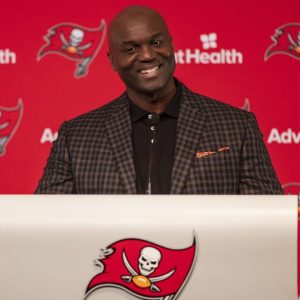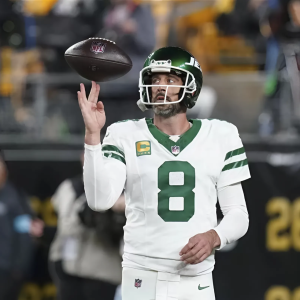HOUSTON — On a Thursday afternoon, Houston Texans coach DeMeco Ryans and offensive coordinator Nick Caley sat side-by-side at the Texans facility for Caley’s introductory news conference.
Ryans smiled as he expounded on why he chose Caley, pinpointing his success “in multiple schemes.” Caley, who last served as pass game coordinator for the Los Angeles Rams, also spent eight seasons with the New England Patriots.
“I feel really strong in my conviction that [Caley] can lead us and get us over the hump,” Ryans said. “It’s my job to take this organization to new heights, and I think hiring Nick will help us to get there.”
It served as a reminder of why Ryans was there with a new OC.
Going into Year 3, Ryans will be without his friend Bobby Slowik, whom Ryans brought with him from the San Francisco 49ers but fired after two seasons when the offense regressed in 2024. Slowik was a hot name for head coaching jobs after the 2023 season when he led a high-powered offense with rookie quarterback C.J. Stroud. The tables turned in 2024 as Houston’s divisional-round loss to the Kansas City Chiefs was the exclamation point on a season marred by an inability to protect the quarterback and adjust to opposing defenses.
Stroud was sacked eight times against the Chiefs and pressured on 56% of his dropbacks — the second highest in an NFL playoff game since ESPN began tracking pressure rates in 2009, trailing only former Denver Broncos quarterback Tim Tebow (63%) in 2011.
Two days after the Texans were eliminated, Ryans said the offense had to “improve.” Four days later, Slowik and offensive line coach Chris Strausser were fired.
“It was very hard to let Bobby go,” Ryans said. “Bobby’s a really close friend, as you all know, Bobby’s a great friend of mine. Nothing but love and admiration for Bobby and what he’s done.
“When I got into coaching, Bobby was the one to help me figure it all out.”
Slowik, who was hired Tuesday as the Miami Dolphins senior pass game coordinator, did not return ESPN’s requests for comment. But before the playoffs, he said they “didn’t have as many hot streaks as an offense this year.”
Last season, the Texans had a dip in yards per game (342.4 to 319.7) and points per game (22.2 to 21.9) while sacks went up (47 to 54). Slowik’s inability to adapt led to a predictable offense that left Houston searching for answers.
“We simply weren’t good enough offensively,” a team source told ESPN. “We had all season to make adjustments and improvements, and it never happened.”
As the struggles mounted, some players lost faith in Slowik, a team source said. Before Ryans fired Slowik, Ryans asked players for their opinions and didn’t get many ringing endorsements, multiple team sources confirmed.
“I don’t think we had a true identity of what the f— we wanted to do,” one player told ESPN.
SLOWIK WAS INSTRUMENTAL in Stroud’s historic rookie season. Stroud became the fifth rookie to throw for more than 4,000 yards and led the league in passing yards per game for qualified quarterbacks (273.9).
The Texans ranked 12th in total offense (342.4), seventh in passing yards (4,173) and 12th in completions (114) to wide-open targets, a reflection of Slowik’s creative play designs.
The Tennessee Titans, Seattle Seahawks, Atlanta Falcons, Washington Commanders and Carolina Panthers interviewed Slowik after the 2023 season, but he returned to Houston with a significant pay raise, according to a team source. Despite Houston’s offensive issues this season, he got an interview request last month from the New York Jets, who hired Detroit Lions defensive coordinator Aaron Glenn.
The Texans added two Pro Bowlers for the 2024 season — wide receiver Stefon Diggs and running back Joe Mixon — to a group with proven playmakers. Expectations were high, but much of that was derailed by protection issues.
In Year 2, the pass-blocking issues started in Week 1. Even though the offense was sharp in the 29-27 win over the Indianapolis Colts, Stroud was sacked four times.
“We’ve got to put on film that we can handle [pressure],” Ryans said after the opener. “There’s too many times where someone touched the quarterback. … It just can’t happen.”
Stroud wasn’t allowed to change protections at the line of scrimmage often in Slowik’s offense. It was the center’s responsibility. A lot of the calls were considered “basic,” according to a team source, as simple as having three offensive linemen zone blocking to one side while the backside blockers were one-on-one with the backside rushers.
But the lack of communication within those blocking plans versus stunts led to free rushers, which is why Stroud faced 52 unblocked pressures, which was second most in the NFL, according to Next Gen Stats.
Trusting Strausser’s approach wasn’t easy for some players either, according to a team source, as he struggled to connect with the offensive line. But the woes weren’t all on Slowik or Strausser. Sometimes, players failed to execute.
“We really just got to take what we’re applying at practice and take it to the field. We are not doing that right now,” left guard Tytus Howard told ESPN after the Texans’ Week 9 loss to the Jets. “The quarterback’s getting hit too much.”
The loss to the Jets was a boiling point. The Texans were 6-2 going into the game, and Stroud ranked sixth in passing yards (1,948), tied for 10th in touchdown passes (11) and 10th in QBR (60.8). Houston was without Collins and Diggs, but the Jets were 2-6.
Stroud was sacked a career-high eight times. In the locker room, players were frustrated because they viewed losing to a struggling team as unacceptable for a contender — leading to a players-only meeting the following week.
“We can’t lose to teams like the Titans and the Jets,” team captain and defensive end Will Anderson Jr. said after the season
Postgame, Stroud said it wasn’t “easy” to operate under constant pressure and added that their problems are “bigger” than the absence of Collins and Diggs.
“There’s things that, even if they were out there, it wouldn’t even help,” Stroud said.
MAKING ADJUSTMENTS WAS an issue for the offense throughout the season.
The Texans averaged 13 points in the first half, eighth best, but once defenses countered in the second half, they averaged 7.5 points, last in the league. A prime example was against the Lions in Week 10. The Texans scored a season-high 23 for a half and entered the locker room leading 23-7.
Slowik discussed the potential tweaks with the players but stuck with what they had been doing, according to a team source. But the Lions adjusted. Cornerback Carlton Davis III hauled in an interception by jumping in front of a quick pass by Stroud to start the half. They limited the Texans’ rushing attack to 3.4 yards per carry and allowed one rushing first down. And on third downs, they went man coverage and had a spy over the middle to muddy in-breaking routes, a Houston staple.
Stroud threw two second-half interceptions as the offense had 97 total yards, zero points and five first downs. Despite Lions quarterback Jared Goff throwing a career-high five interceptions, kicker Jake Bates nailed a 52-yard walk-off field goal to beat the Texans 26-23.
“If the defense doesn’t play that way, we don’t have a chance to come back and win it,” Lions coach Dan Campbell said. “… We made a couple of adjustments at halftime, but we also knew we were playing good ball.”
A somber Stroud stood at the podium, giving short answers as he took accountability, saying, “This game is on me.”
Simply put, the opponent adjusted. The Texans did not.
“When teams would take away what we wanted to do, we didn’t have answers for it,” one player told ESPN.
TWO DAYS BEFORE the Texans played the Baltimore Ravens on Christmas Day in Week 17, Stroud addressed the team.
With the biggest game of the season ahead and a chance to prove they could compete with one of the AFC’s best, Stroud wanted teammates to find their joy, saying, “The difference [from Year 1] to this year, I haven’t had as much fun.”
A season-long theme for Stroud was rediscovering the fun in football again as the offensive struggles were mounting. “My dad has this saying that joy is an acronym for ‘just over yonder,'” Stroud told ESPN. “So your happiness is just over yonder, you gotta go get it. That’s what I talked about. Just getting your joy back.”
But it was another joyless outing, resulting in a 31-2 loss, the Texans’ largest margin of defeat in the Stroud-Ryans era. Fans booed the team before leaving NRG Stadium, in some cases at halftime, creating an empty venue resembling a public scrimmage. It was the first time in his NFL career that a Stroud-led offense had been held scoreless, and he was sacked five times.
From Weeks 9 to 18, Stroud was contacted 58 times (tied for seventh most) on pass plays and was sacked 30 times (tied for second). During that stretch, his QBR plummeted to 39 (29th), and he completed 59.8% of his throws (29th) and threw for 1,779 passing yards (24th) with nine touchdowns (tied for 24th).
There were differing opinions on why Stroud’s play tailed off, but none of the sources ESPN spoke to believe it’s a talent issue. Multiple team sources believe Slowik was trying to make Stroud a system quarterback versus getting him to play more naturally, which is being a playmaker and pushing the ball down the field.
One team source said Slowik overcomplicated reads, which didn’t allow Stroud to play fast.
“There’s times where I sit back there, and I’m thinking too much,” Stroud said after the loss to the Jets.
“I just feel like [the offensive coaches] were just putting a lot of pressure on him,” a team source told ESPN.
The Texans’ final quarter was a fitting end as Chiefs defensive coordinator Steve Spagnuolo sent a dizzying array of pressure at Stroud, blitzing him on 10 of his 18 fourth-quarter dropbacks. Stroud was 3-of-8 for 41 yards with two sacks and six unblocked pressures when blitzed as Houston scored zero points.
Spagnuolo had a bead on Houston’s pass protection plans and found ways to get defensive end George Karlaftis, the Chiefs’ regular-season leader in sacks (eight), to match up one-on-one against tight end Dalton Schultz, leading to three sacks. Ryans has led Houston to the playoffs and the AFC South title in each of his seasons as head coach. When asked why he fired Slowik and hired Caley, his reasoning centered on getting to the Super Bowl.
For his part, Caley said it’s about getting the players back into an offense they trust.
“I am really excited to evolve this scheme,” Caley said. “It’s not going to be my spin, it’s going to be what’s best for our players. We aren’t pounding a square peg into a round hole.”
Making the scheme less predictable and giving the line the tools to protect the quarterback will go a long way in helping the Texans take the next step.
“C.J.’s already a great player,” Ryans said. “It’s just getting everybody on the same page. We talked about that communication — all 11 guys being on the same page. We do that, and instantly C.J. will be better.”
Page 3

Close
- Rob Demovsky is an NFL reporter at ESPN and covers the Green Bay Packers. He has covered the Packers since 1997 and joined ESPN in 2013. Demovsky is a two-time Wisconsin Sportswriter of the Year as selected by the NSSA.
GREEN BAY, Wis. — There are no easy offseasons in the NFL. For the Green Bay Packers, however, when it comes to tough decisions about whether to keep, cut or restructure veterans with high-priced contracts, while also re-signing their own free agents, this one should not be overly taxing.
When it comes to re-signing any of the Packers’ 11 impending unrestricted free agents, the closest thing general manager Brian Gutekunst has to a must is kicker Brandon McManus, whose midseason addition stabilized a position that had been in flux since they moved on from Mason Crosby after the 2022 season.
The rest — from center Josh Myers to defensive contributors, such as tackle T.J. Slaton and linebackers Isaiah McDuffie and Eric Wilson — could be considered luxuries.
And then there’s cornerback Jaire Alexander, the two-time All-Pro, who would make $17.5 million if he’s on the team next season.
Here’s a look at the key decisions Gutekunst must make early in this offseason. They fit into four categories: let go/release, re-sign cheap, possibly re-sign at the right price, and must re-sign.
Let go/release
There are strong indications that Alexander’s time with the Packers will end without him playing another down. Multiple team sources have privately expressed their frustration with Alexander’s inability to stay healthy and/or play through injuries.
For the second straight season, Alexander appeared in seven of 17 regular-season games. He did not play after Nov. 17 — despite practicing on a semi-regular basis — went on injured reserve the final week of the season and underwent knee surgery on what he said was a torn PCL. Still, he finished second on the team in pass breakups (seven) and tied for second in interceptions (two).
The 2018 first-round pick has two years remaining on the four-year, $84 million contract extension that made him the highest-paid cornerback in the NFL at the time. The Packers would pick up nearly $6.8 million in salary cap space for 2025 if they release him (or more than $17 million if they designate him a post-June 1 cut).
Publicly, Gutekunst was noncommittal about Alexander’s future shortly after the season.
“I know it’s been really, really frustrating for not only him as a player, but us as a club,” Gutekunst said. “When you have a player who’s done what he’s done for us in the past, and then not being able to get him out on the field consistently, that’s tough. You know it’s tough on the player, tough on the organization.”
Alexander declined to speak with reporters on the last day of availability at the end of the season, saying he had “nothing good to say” and that he did not know if he would be back with the team in 2025.
On the same day, Keisean Nixon was lobbying to be the No. 1 cornerback, a job Alexander held when available.
Fellow first-round cornerback Eric Stokes also could be looking for work elsewhere. He hasn’t returned to the form he had during his rookie season, following multiple injury-filled seasons. He had 14 pass breakups and an interception as a rookie in 2021. In three seasons since then, he played 1,175 snaps over 29 games without a single pass breakup or interception.
Veteran offensive tackle Andre Dillard was signed last offseason to a one-year, $1.25 million contract and played only 13 offensive snaps.
It’s unclear whether running back AJ Dillon, who missed all of last season because of a neck injury, has been cleared to return, but the Packers liked what they got from Chris Brooks and Emanuel Wilson as backups to Josh Jacobs. They also have high hopes for 2024 third-round pick MarShawn Lloyd, who played only 10 offensive snaps as a rookie.
Re-sign cheap
This group includes three core special-teamers who have had backup roles: defensive backs Corey Ballentine and Robert Rochell, along with tight end Tyler Davis.
Davis, who was a favorite of special teams coordinator Rich Bisaccia, hasn’t played in a regular-season game since the 2022 season after he suffered a serious knee injury in a 2023 preseason game and a serious shoulder injury last summer.
Ballentine has played in 37 games with seven starts at cornerback since he joined the Packers in 2022, while Rochell has played in 20 games over the past two seasons.
If re-signed, all three would likely get a veterans minimum contract.
Possibly re-sign
This is where the decisions get a little more difficult.
Myers has started all 56 games he’s played in since the Packers picked the center in the second round of the 2021 draft. A long-time NFL offensive line coach said the value of the center-quarterback relationship should not be underestimated. A year ago, the Packers let guard Jon Runyan Jr. leave in free agency, and Runyan got $10 million a year from the Giants. Myers would likely cost at least that much.
The Packers drafted a center, Jacob Monk, in the fifth round last year, but he did not play a snap on offense as a rookie. It’s not out of the question the Packers could move Zach Tom from right tackle to center, especially if they want last year’s first-round pick Jordan Morgan to play tackle. However, Zach has established himself as a top-level right tackle and would want to be paid as such.
Slaton was one of the keys to the Packers’ resurgent run defense, which ranked seventh in rushing yards allowed in 2024. He’s not a full-time, three-down player and ranks No. 3, at best, on the defensive tackle depth behind Kenny Clark and Devonte Wyatt.
Linebackers Isaiah McDuffie and Eric Wilson combined to play more than 1,200 snaps last season, and defensive coordinator Jeff Hafley raved about how well both fit into his scheme. But the Packers need to get Edgerrin Cooper more involved after a stellar rookie season in a part-time role, which means the Packers might be reluctant to re-sign both of them given they also have Quay Walker back. Wilson, an eight-year veteran, was on a one-year deal that contained only a $167,500 signing bonus, while McDuffie has come to the end of his rookie contract.
Must re-sign
McManus’ arrival in October turned around the Packers’ dreadful kicking game.
After 16 years with Mason Crosby, the Packers cycled through Anders Carlson in 2023 and Brayden Narveson in early 2024. Those two combined to miss 18 field goals and extra points in 25 games, including in the playoffs.
McManus made 50 of 51 field goal and extra point attempts in 11 regular-season games with the Packers. Although he missed a short field goal in the playoff loss to the Eagles, he showed no signs that he has lost anything at age 33. He came cheap last season (veterans minimum) because he was coming off an NFL personal conduct policy investigation, which resulted in no penalty. Before that, he had signed for $3.6 million with the Commanders, who released him before he ever kicked for them.
“If we were able to get Brandon back, I think certainly that would make me feel very, very, very good about that [specialist] group,” Gutekunst said.





